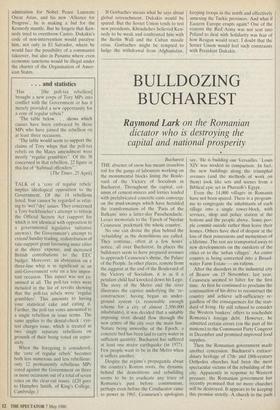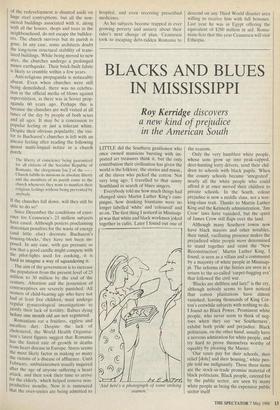BULLDOZING BUCHAREST
Raymond Lark on the Romanian
dictator who is destroying the capital and national prosperity
Bucharest THE absence of snow has meant ceaseless toil for the gangs of labourers working on the monumental blocks lining the Boule- vard of the Victory of Socialism in Bucharest. Throughout the capital, col- umns of cement-mixers and lorries loaded with prefabricated concrete casts converge on the mud-swamps which have heralded the transformation of the 'Paris of the Balkans' into a latter-day Passchendaele. Lesser memorials to the 'Epoch of Nicolae Ceausescu' pockmark the whole country.
No one can divine the plan behind the 'rebuilding' as the demolitions are called. They continue, often at a few hours' notice, all over Bucharest. In places the bulldozers seem to have prepared avenues to approach Ceausescu's shrine, the Palace of the People. In other places, remote from the ziggurat at the end of the Boulevard of the Victory of Socialism, it is as if a petulant child had knocked down his Lego. The story of the Metro and the river illustrates the caprice underlying the 're- construction', having begun an under- ground system (a reasonable enough scheme for a city of almost 2,500,000 inhabitants), it was decided that a suitably imposing river should flow through the new centre of the city over the main line. Nature being unworthy of the Epoch, a concrete bed has been laid to carry water in sufficient quantity. Bucharest has suffered at least one major earthquake (in 1977). Few people want to be in the Metro when it suffers another.
Despite the regime's propaganda about the country's Roman roots, the dynamic behind the demolitions and rebuilding seems to be to eradicate any trace of Romania's past before communism, perhaps even before the Conducator came to power in 1965. Ceausescu's apologists say, 'He is building our Versailles.' Louis XIV was modest in comparison. In fact, the new buildings along the triumphal avenues (and the methods of work on them) look like sets and scenes from a Biblical epic set in Pharaoh's Egypt.
Even the 14,000 villages in Romania have not been spared. There is a program- me to congregate the inhabitants of each village into a single tower-block, with services, shop and police station at the bottom and the people above. Some peo- ple commit suicide rather than leave their homes. Others have died of despair at the loss of their possessions and mementoes of a lifetime. The rest are transported away to new developments on the outskirts of the cities or to the 'urban villages'. An entire country is being converted into a Broad- water Farm Estate — on rations.
After the disorders in the industrial city of Brasov on 15 November, last year, Ceausescu seemed to falter for the first time. At first he continued to proclaim the continuation of his drive to reconstruct the country and achieve self-sufficiency re- gardless of the consequences for the stan- dard of living. He still refused to consider the Western bankers' offers to reschedule Romania's foreign debt. However, he admitted certain errors (on the part of his minions) to the Communist Party Congress in December and promised improved food supplies.
Then the Romanian government made another concession. Bucharest's extraor- dinary heritage of 17th- and 18th-century Orthodox churches had been the most spectaeular victims of the rebuilding of the city. Apparently in response to Western pressure, the Romanian government has recently promised that no more churches will be destroyed. It appears to be keeping this promise strictly. A church in the path of the redevelopment is shunted aside on huge steel contraptions, but all the non- sacred buildings associated with it, along with all the houses, shops and trees in the neighbourhood, do not escape the bulldoz- ers. The church survives but its parish is gone. In any case, some architects doubt the long-term structural stability of trans- lated buildings. While being moved to new sites, the churches undergo a prolonged minor earthquake. Their brick-built fabric is likely to crumble within a few years.
Anti-religious propaganda is noticeably absent. Even when churches were still being demolished, there was no celebra- tion in the official media of blows against superstitition, as there was in Soviet prop- aganda 60 years ago. Perhaps this is because the churches are well visited at all times of the day by people of both sexes and all ages. It may be a concession to Popular feeling or just a tolerant whim. Despite their obvious popularity, the visi- tor to Bucharest's churches is left with an uneasy feeling after reading the following quaint multi-lingual notice in a church Porch:
The liberty of conscience being guaranteed for all citizens of the Socialist Republic of Romania. the clergymans [sic:1 of the — Church fulfills its missions in absolute liberty and the members of its parish come to the church whenever they want to manifest their religious feelings without being prevented by anybody.
If the churches fall down, will they still be able to do so?
Since December the conditions of exist- ence for Ceausescu's 23 million subjects have eased. Although posters proclaiming draconian penalties for the waste of energy (and little else) decorate Bucharest's housing-blocks,' they have not been im- posed. In any case, with gas pressure so low that a good candle Might compete with the pilot-lights used for cooking, it is hard to imagine a way of squandering it.
The aim of the government is to increase the population from the present level of 23 Million to 30 million by the end of the century. Abortion and the possession of contraceptives are severely punished. All women of child-bearing age who have not had at least five children, must undergo regular gynaecological investigations to justify their lack of fertility. Babies dying before one month old are not registered.
Romanians eat a fruitless, eggless and meatless diet. Despite the lack of Cholesterol, the World Health Organisa- tion's latest figures suggest that Romania has the fastest rate of growth in deaths from heart disease in Europe. Stress seems the most likely factor in making so many the victims of a disease of affluence. Until February, ambulancemen usually inquired after the age of anyone suffering a heart attack, and then took their time to arrive for the elderly, which helped remove non- productive mouths. Now it is rumoured that the over-sixties are being admitted to hospital, and even receiving prescribed medicines.
As his subjects become trapped in ever growing poverty and anxiety about their ruler's next change of plan, Ceausescu took to escaping debt-ridden Romania to descend on any Third World disaster area willing to receive him with full honours. Last year he was in Egypt offering the equivalent of $200 million in aid. Roma- nians fear that this year Ceausescu will visit Ethiopia.























































 Previous page
Previous page